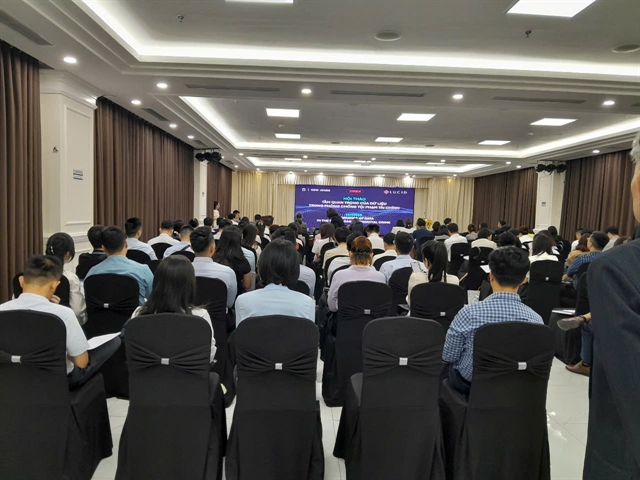 Economy
Economy


|
| A view of the conference. VNS Photo |
Thu Hà
HÀ NỘI — Data plays a key role in preventing financial crime so financial institutions, especially banks, need to effectively apply and leverage data analysis to mitigate risks, experts said at a conference yesterday.
At the forum on the importance of data in the fight against financial crime held in Hà Nội yesterday, Nguyễn Thanh Sơn, Director of the Vietnam Banks Association’s Training Centre, said that data plays a critical role in preventing financial crimes. The effective application and analysis of data, especially information about customers on blacklists or identified as at risk of money laundering, terrorism, corruption, or embargo violations, are key factors in minimising risks for financial institutions.
“Alongside promoting technology and innovation, data is playing an increasingly important role, particularly in the finance and banking sector. The importance of data has been highlighted in Resolution No. 57-NQ/TW dated December 22, 2024 of the Politburo, which clearly identifies data as central to digital transformation and the digital economy, and as a key driver of national development,” Sơn said.
According to Sơn, in Việt Nam, financial crimes, especially cybercrimes and money laundering have been increasing in recent years, with sophisticated methods causing huge losses. Therefore, the Government, the State Bank of Vietnam (SBV) and relevant ministries have been implementing various drastic solutions, including increasing the application of data and technology to combat and prevent all types of crimes, especially financial crimes.
The Government has issued Project 06, which focuses on developing resident data, electronic identification and authentication applications to support the country's digital transformation in the 2022-2025 period, with a vision to 2030
The SBV has also recently issued Decision No. 67/QĐ-NHNN on a digital transformation project aimed at deploying core utilities for the development of the banking sector, ensuring connection with Project 06. Under the project, the SBV requires financial institutions to use the national database on population, identification and electronic authentication for banking activities, thereby supporting digital transformation and enhancing the effectiveness of crime prevention.
Sơn said that all customer data in the CIC credit information database will be verified to confirm the legality and accuracy of customer identification. In addition, all customers opening payment accounts, bank cards, e-wallets, or making electronic payment transactions will have their customer identification information verified.
“Việt Nam's legal framework and policy mechanisms to combat financial crimes are increasingly comprehensive and alined with international standards and trends,” Sơn said.
Speaking at the event, the CEO of Lucid Groupe, Tuck Chan, said that, in today’s rapidly evolving regulatory landscape, the challenges of identifying and mitigating financial crime risks are more complex than ever.
“Financial institutions are on the front lines, tasked with navigating intricate webs of regulations, sanctions lists, politically exposed persons, and adverse media. At the heart of this challenge lies the fundamental need for accurate data and robust screening,” Chan said.
According to Chan, the quality of data becomes non-negotiable. An accurate, reliable and comprehensive list of names is not just a compliance checkbox. It is a foundamental element of an effective anti-money laundering programme.
At the event, the Deputy Director of the SBV’s Anti-Money Laundering Department, Nguyễn Thị Minh Thơ, briefed participants on the legal framework to combat financial crime, including the Anti-Money Laundering Law and the Anti-Terrorism Law.
According to Thơ, to minimise financial crime, the SBV requires that domestic transactions worth VNĐ400 million (approx. US$15,500) or more must be reported to the SBV. For international transactions, the reporting threshold is $1,000. — BIZHUB/VNS




